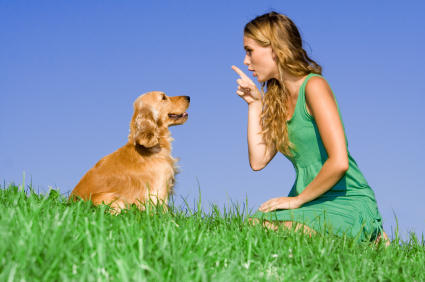Training makes your pup an enjoyable member of your family. Build on the puppy party foundation by taking your dog to obedience school or adolescent classes.
 Training your puppy should be fun for you both – don’t turn it into a chore. Make it part of your everyday routine. Ask your puppy to sit before meals, before a walk and before a game.
Training your puppy should be fun for you both – don’t turn it into a chore. Make it part of your everyday routine. Ask your puppy to sit before meals, before a walk and before a game.
Introduce your pup to a wide variety of places, people, animals and toys in the first few months. This gives him the skills to cope with novel situations and makes him tolerant of the things he will encounter often later in life.
Training sessions must be short, sharp and exciting. Young puppies only have a very short attention span so limit training to five minutes, two or three times a day.
Be consistent with your commands. Pick one word for each action and stick to it. Your pup will find it easier to recognise a single command word rather than two or three combined.
Use your dog’s name before every command to get his attention. Sound excited and happy so that he stops whatever he is doing and looks to you.
 Build a positive association between praise and reward by saying “good dog” before giving a food reward.
Build a positive association between praise and reward by saying “good dog” before giving a food reward.
Say “ah-ah” when he does the wrong thing and do not give a reward of any kind. For example, if the puppy lifts his front feet off the ground when you are giving a food reward say “ah-ah”, withdraw the treat and wait until the puppy holds the sitting position before giving it.
Remember that actions speak louder than words. Dogs read our body language and tone of voice as well as our words. Always talk to your puppy in a pleasant, friendly tone of voice. Voice tone is as much a positive reinforcement as an edible treat or toy.
Do not continue a training session if you feel cranky or tired, or if the session is not going well. Training should be fun for both of you. If your voice is sharp or stern your puppy will think he has done something wrong.
Find the reward that best encourages the desired behaviour. Most dogs enjoy food treats. Others are motivated by toys or displays of affection.
Most dogs value small pieces of moist meat over dry foods. If you are teaching something new or there are many distractions meat treats are more effective.
Alternate treats with praise, like “yes” or “good”, pats or toys.
Once he has learned a new command or trick, use rewards intermittently to increase his motivation. He will keep hoping that this time he will be rewarded.

